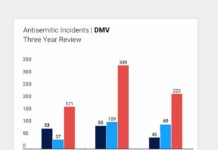
Attribution-ShareAlike 3.0 Unported (CC BY-SA 3.0)
In March 2021, reporting by Haaretz journalists Aaron Rabinowitz and Shira Elk revealed allegations of sexual abuse against Yehudah Meshi-Zahav, the founder of Zaka, the Jerusalem-based search-and-rescue unit and an Israel Prize recipient.
The revelations about Meshi-Zahav, who would later attempt suicide, led to shock in the haredi Orthodox world and, this week, the top prize given to Israeli journalists. It also generated a flood of tips that led to a new investigation — and an unprecedented response.
“After we published the Meshi Zahav story, the names of many senior haredi figures came to us, people about whom there were allegations of abuse of kids, of male students, of girls — everyone with their own story,” Rabinowitz said in a phone interview. “Roshei yeshivot [yeshiva heads], members of the media, educators, businessmen, all kinds of people.
“The name that came up most significantly, from many places and many directions, was [Chaim] Walder.”
So Rabinowitz and Elk began an investigation into Walder, an Israeli author and therapist whose “Kids Speak” book series have been longtime bestsellers in the fervently Orthodox market. A month later, with nothing to go on but rumors and second-hand accounts, they were ready to move on.
“But then, a story came to us from someone who was, with absolute certainty, a victim,” said Rabinowitz. “We went back to investigating, and we found another story and another story and another story and another story.”
In the end, Rabinowitz and Elk published accounts earlier this month from three women who were allegedly sexually exploited by Walder, two of whom were minors at the time — and they spoke with many more. (Walder’s attorney has denied their allegations.)
“It is by chance that the three accounts are all from more than 20 years ago — there were stories from as far back as 25 or 28 years ago, as well as from recent years,” he said.
Their exposé, published two weeks ago, set off a backlash rarely seen following accusations of abuse against influential Orthodox figures, including a decision by a Brooklyn bookstore and Walder’s publisher to stop selling his books.
Rabinowitz shared the research process behind the exposé, what he thinks about the reaction to the allegations against Walder, and more.
This interview was translated from Hebrew and edited for length and clarity.
The women who were willing to talk to you about their experiences for the article — did they seek you out?
Aaron Rabinowitz: No, they didn’t come to us. We sought them out. Overall, they were women who didn’t want the exposure, and they didn’t have an agenda or someone behind them or anything like that. It was very difficult to convince them to speak; it was not something they did readily or with relish, not at all.
How did you find them?
Therapists, or say a friend whom a victim shared her story with years ago, would hear something from someone about Walder and say to themselves, “Let’s give it a try.” They’d approach the victim, not thinking for a moment she would say yes — after all, she maintained her silence all this time — but against all expectations she would agree to let them connect her with us.
Once they facilitated the connection, we had to convince the victims why it is important, why they should tell the story; how we could protect them and that the price they would pay would be as minimal as possible, addressing each one and her fears of exposure. It’s a process of building trust that we will tell their story in a dignified way that protects their privacy, and it takes time. It took months.
After the interviews came investigating all of the details they gave us, and then you have to pass through a very strict and comprehensive legal consultation to be able to publish something like this.
Did the women who were not bound by a non-disclosure agreement give any explanation for why they hadn’t come forward until now?
As with any male or female survivor of sexual abuse, there is a great deal of shame and repression. They engage in the subject with great difficulty, and most people who experience sexual assault prefer not to deal with it at all — it is too hard and too painful. They prefer to repress, not to tell anyone, not to seek treatment. In part, of course, this is out of fear that the perpetrator will ruin their lives if they speak out.
These dynamics — the fear, the pain, the repression — that is why it takes years to learn to deal with oneself, then one’s immediate environment, then the surrounding environment. When someone is sexually assaulted it is an assault inflicted deep, deep within the soul; it is very much like murdering a person’s soul, for sure if we’re talking about a child or adolescent.
And people don’t understand this. They don’t understand that it takes many years to succeed in coping with something like this, and they don’t understand the consequences it has in every area of life for the individual. It is, in my eyes, first-degree murder.
When allegations of abuse come out, there are always people who express concern about false accusations. As a journalist, what do you use as your barometer for truth when investigating stories like this?
I can say, categorically, that the majority of people who confide that they were victims of sexual assault are not lying, and I’ll explain. They aren’t lying because they don’t have a motive to lie. Because they won’t gain anything from this. The victims who spoke with me won’t make any money off of this. They won’t earn any praise or honors. The only things these victims will earn are insults, disbelief, curses and distrust in their homes from family members who don’t believe them. Basically, the world will murder them, again. What reasonable person would do this to themselves?
Second, you sit and listen to a person’s story not once but multiple times, all the while getting an impression of them and looking for deviations in the versions of the story they tell you.
Third, you probe the details. If he says that a decade ago he told a number of good friends about something, you go find those friends and you probe them, too, their account of what he said and how he said it. If he says he was seeing a therapist 10 years ago, you go to the therapist. You really investigate him. Because people don’t conduct a conspiracy over the course of 10, 15 years, telling things to all sorts of people and going to therapy and living a life that is — excuse the expression — bullshit, in order that in 15 years they can create some kind of conspiracy and “accidentally” meet Aaron Rabinowitz and tell him that specific story.
Now, say a girl can tell you about the minutest of details — she knows exactly where Walder’s basement was, how many rooms were in it and what hung on the wall; she remembers the hotel he took her to and what was in the hotel; she remembers details of the car he abused her in 25 years ago and you check and it matches the type of car he had at the time — this is not something someone can arrange 25 years earlier.
And this is just in one story. If you find more accounts, from people with no connections to each other, together they serve to strengthen each other.
I’ll tell you one more thing. If there is a 1% chance that a story is incorrect, I cannot kill the [accused] and seal his fate. If I publish something, it isn’t because we’re at 99% — it’s because we’re at 100%. And what you read in an investigative article is only about 5% of what we actually found. We restrain ourselves to the content with the highest level of certainty, but there is still tons and tons of additional material that doesn’t make the cut.
In a recent radio interview, Rabbi Shmuel Eliyahu, a member of the council of Israel’s Chief Rabbinate, said the rabbinic authorities based their decision to denounce Walder not on the basis of the news article alone, but that they also reviewed material such as court documents detailing Walder’s involvement with married women which they apparently had reviewed even before the article appeared. Do you have any idea based on your research why they didn’t take action earlier?
To the best of my knowledge, what they had before the article was published was maybe not enough. I haven’t spoken with any of them and I am not in touch with them, but if all they had to start with were rumors and word of mouth about things that were morally wrong but not criminal, and there wasn’t enough evidence to believe any of it — there isn’t exactly anything to do with that. Involvement with married women, ostensibly consenting adults, isn’t talked about because it’s uncomfortable — it’s embarrassing and it makes everyone squirm in their chairs — and for sure people who heard one story or one rumor didn’t know that there was a larger puzzle.
No one knew there was something much broader going on. To our chagrin, it was necessary for journalism to publicize the story. And then, boom: “The story I know isn’t the only story.” Little by little, the full scope is revealed. Even today, we don’t yet know the full extent of how many people Walder harmed.
What was your reaction to the initial response from rabbinic leaders and businesses in Israel and the United States to the revelations in the article?
My reaction was mixed. On one hand, it gives hope that, for the first time in history, central institutions of haredi society are dealing with sexual assault in a public manner. It is unprecedented.
On the other hand, the step that would complete the revolution would be [for the community] to come out in public support of survivors, for the rabbis to put out a letter directing victims to go to the police, to file complaints, to take abusers to court.
The response gives hope that this step is something that will yet occur, that the day will come when the rabbis will put out an unequivocal statement in response to an incident like this directing anyone who was abused to report it to the police.





